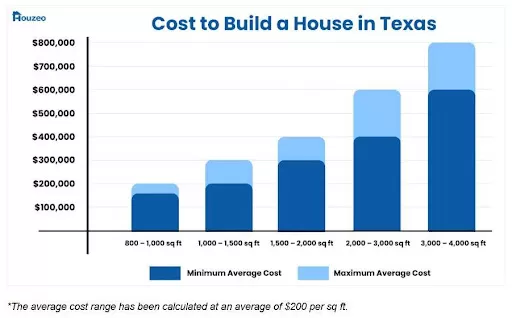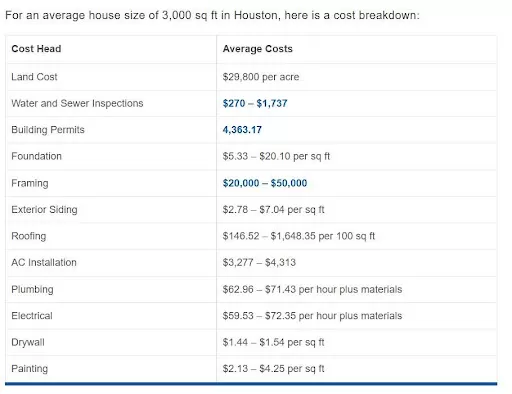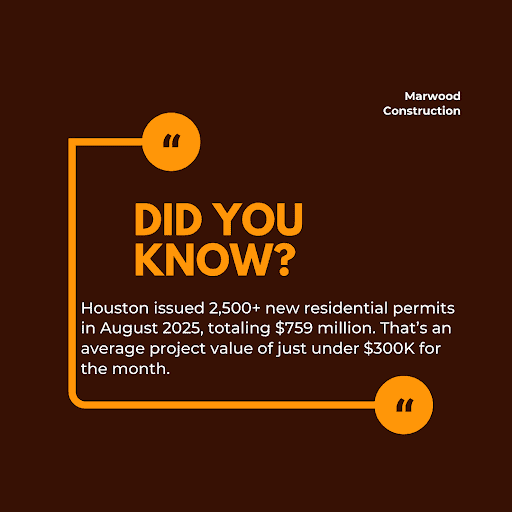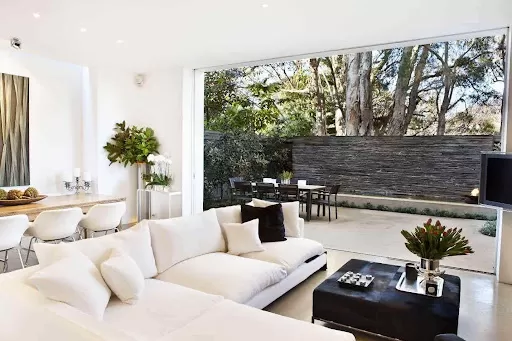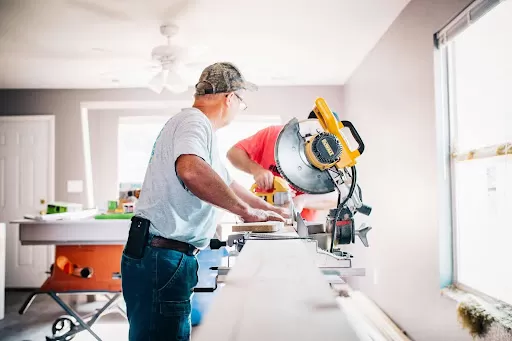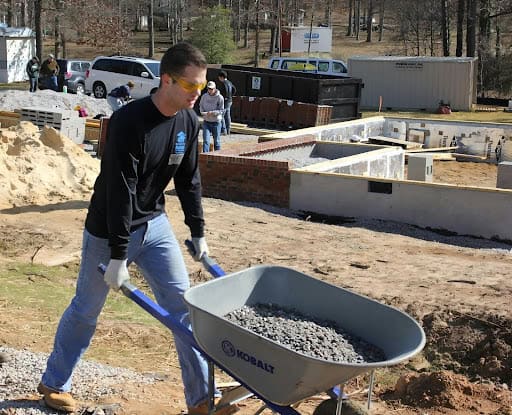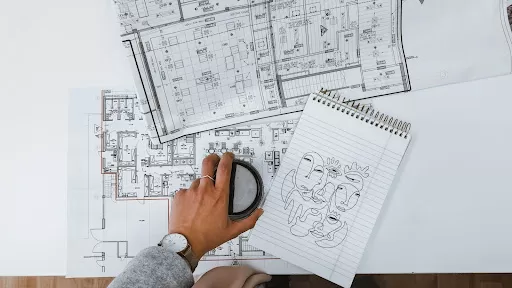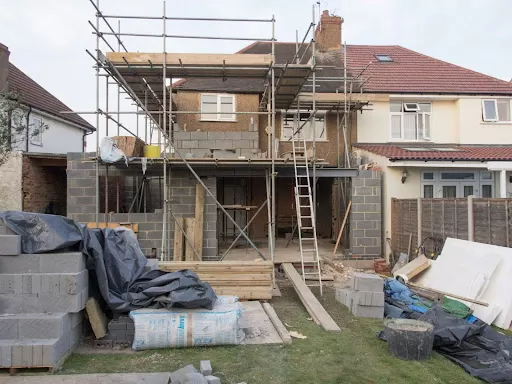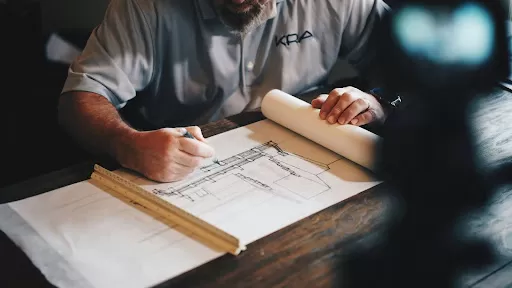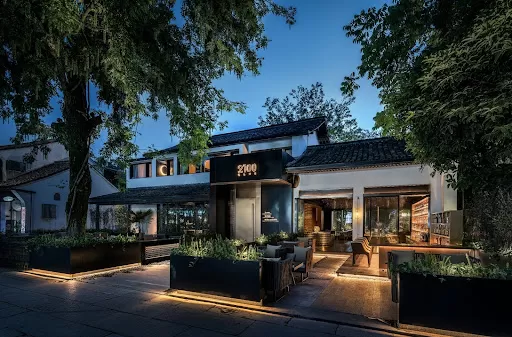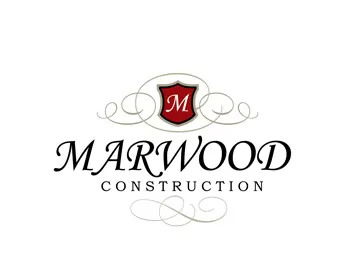
So, what’s the real cost to build a house in Houston? You think you’re onto something with a quote, then the numbers change as soon as you start the first phase of the plan, and now it’s not what you thought.
Really makes you wonder if anyone has the full picture of it or if it’s just part of their game to hook you in.
People hit that point pretty quickly, sitting there with plans in their head, but the budget side wobbles all over the place.
And it’s not like you can just skip over the numbers, either. Before there’s even a slab down, you really do need the answer to this question: “how much would it cost to build a house?”
But then every builder you talk to gives you a different number. One is on about square footage, another’s spinning you on finishes or site preparations.
The numbers just don’t match, and you’re left thinking, Alright, so which bit actually matters most?
Feels easier when you strip it back, though. Look at the local market, the design features you care about, and the land itself. Then at least you have something solid to plan around.
Read on to learn how Houston builders actually break down the cost to build a house, what drives it up or down, and the factors you can focus on to get a real estimate that sticks.
What Is the Average Cost to Build a House in Houston?
Depends on who you ask and what you’re actually after. When you look at the market, you’ll get a ballpark figure like $150 to $250 a square foot in 2025, which sounds tidy enough until you run it through for a decent-sized place.
Say 2,500 square feet, that’s what, around $375,000 to $500,000, and that’s not even touching land or site work or all the other things you’ll have to factor in.
Houzeo says it can be closer to $100 on the lower end, going up to $200 if you’re looking for nicer finishes. Which, yeah, widens the gap even more.
Using that measure, a build could be anywhere from about $250,000 right up near $650,000 (again, before extras).
Houston’s own permit data kind of puts it in perspective. They pushed through over 2,500 new residential permits in August 2025 (total value of about $759 million). That shakes out to an average project value sitting just under $300,000 for that month.
It’s not the full story, obviously, but it does give a snapshot of what people are actually spending, and not just what builders are quoting.
So yes, the answer to “how much does it cost to build a house” questions… really changes depending on where you stand, what you want, and who you talk to.
Take these ranges as rough markers and then have a talk with reputable local builders (like Marwood Construction) to nail down what suits your plans.
How Do Builders Qualify Their Cost Estimates?
The thing with builders in Houston (or anywhere else in the US, for that matter) is that they’re not usually going to throw out a single neat number when you ask how much it costs to build a house.
Nine times out of ten, you’ll hear the old “it depends” because, well, it really does. Every building lot is different, every design process is different, and what you want in the finishes can swing the price around a fair bit.
Most of the time, you’ll get two types of answers. The first one’s more of a ballpark. They’ll look at the size of the place, how many floors, the type of finishes, and whether you’re adding in extras like a luxury outdoor kitchen or custom cabinetry. That’s when you hear a number like $150 to $250 a square foot for a mid-range custom home. It’s handy early on, gives you a sense of how design choices changes the target construction budget. But it’s only ever a guide, not locked in.
Then there’s the actual home construction price, and that’s another story. To get that, the builder needs proper documents: drawings, engineering, and all the specs laid out. Even things like soil conditions or where utilities run will affect the cost to build a house. Without that detail, they just can’t give you a firm contract.
And that’s where those documents earn their keep. They spell out materials, dimensions, and mechanical connections, so the trades can price it properly. Cuts down on those dreaded change orders that sting the budget mid-build.
Once you get the difference between a rough estimate and a true construction price, planning becomes much clearer.
What Factors Influence the Final Cost to Build a House?
People always ask “how much does it cost to build a house,” as if there’s one tidy answer. But it’s never that clean. The truth is, it depends on a basket full of things you might not even think about until you’re in the thick of it.
The number you start with rarely ends up being the number you finish with. It shifts around based on choices you make, sure, but also on stuff you can’t control, like the soil of your lot or what the labor supply market’s doing that month.
1. Lot Location and Preparation
The land sets the stage. If you’re looking at something inside the loop, the price tag’s already steeper than going further out. And then you have to think about the existing conditions of the lot itself.
A patch of ground full of trees? You’ll pay for clearing. Uneven terrain? That’s grading costs. Bad soil? Now you’re into piers and an impactful engineered foundation just to make it stable. Plus, if water, sewer, and power are already in place, that’s a relief. If not, you could be looking at septic tanks or wells, which add thousands. That’s why builders like to walk the site before giving you anything close to a real number.
2. Home Size and Layout
The bigger the house, the more it costs. Pretty simple. More square feet means more timber, more concrete, more labour. But floor plan plays a part too. Wide open floor plans and high ceilings need engineered beams and special framing support.
Two stories means stairs and extra framing. Even little things like special ceiling designs or tacking on a study or media room quietly nudge the total higher.
3. Material Quality and Finishes
Stick with builder-grade finishes and you’ll keep things tidy. Start picking stone benchtops, custom cabinetry, imported tiles, and premium flooring, and you’ll see the bill rise quickly.
Even roofing and insulation matter. Energy-efficient products or hurricane-rated windows cost more at the start but save money long term. The hard part is figuring out which upgrades are worth the stretch and which ones you can skip.
4. Design Complexity and Architecture
A simple rectangular box? Cheap to build. Add multiple rooflines, big glass walls, or fancy curved features, and suddenly you need specialists and extra engineering.
That’s more labor hours and more waste. If you’re leaning toward something bold or unusual, having an architect who’ll flag the cost implications early on is a lifesaver. Otherwise, you might get a shock when the quotes roll in.
5. Skilled Labor Market Conditions and Timing
Houston’s building market runs hot and cold. That is due to the economic factors of limited supply. After storms, trades are flat-out and wages climb. Summers can be packed too. But the Houston housing market has been robust for more than a decade. The finer skilled labor trades are in high demand year round.
But then there’s the bigger picture: inflation, supply chain issues, and even fuel prices. Those things sneak into your material and labour costs whether you see them or not.
How Does the Home Building Lot Affect the Cost to Build a House?
The lot you pick has more sway on the budget than most people realize. A lot closer to the city is nearly always pricier than something out in the suburbs, just because space is tight and demand’s high. Add in a nice view or a corner position, and the sticker price climbs again.
Metro Houston is short on a supply of ready to build lots. Owners usually select an older home for sale that is worth more for its land than the house itself. Lot prices in metro Houston range from $80/sf – $125/sf. In comparison, a suburban lot is half that price.
And that’s just the land itself. Once you actually start looking at site prep, the numbers move even more.
Clearing trees, knocking down an old foundation, levelling out uneven ground… all of it needs equipment and teams, and none of that comes cheap.
Plus, Houston’s clay or unstable patches most of the time translates into engineered pier foundations, which adds more cost.
Utilities are another big expense in the rural areas. If the lot doesn’t already have sewer, water, or power set up (as mentioned earlier), you’re paying for hookups or maybe a septic system.
Additionally, all of the surrounding counties have much stricter flood and drainage restrictions. On larger parcels, you may be required to create a retention pond to hold your properties’ rain fall.
What Design and Pre-Construction Costs Should You Expect?
So before you’ve even got a wall going up, you’re basically already spending money. It starts with the architect. They’re the ones sketching up the floor plans, elevations, and the proper drawings that’ll keep everything to your liking and within code.
You’ll often hear design fees are around 7%-10% of the build, or somewhere between $2-$8 a square foot. Depends on how complicated you want things and the amount of details you want represented in your construction drawings.
You also have the structural engineer, and in Houston, you don’t really get away without one. The soil here is… let’s just say not the most reliable. Clay with poor absorption, shifting ground, that sort of thing.
Their job is making sure your foundation and framing can cope with the dynamic loads, and that usually runs anywhere from fifteen hundred up to five grand for a full set of stamped plans.
A lot of people also bring in an interior designer. Helps with picking finishes, cabinetry, and lighting layouts. This might be $50 an hour, could be $200, sometimes a percentage of the build.
And if you have dreams of big outdoor areas or a pool, a landscape architect might also be involved. That starts at $2,000 and climbs pretty quickly for extensive projects.
How Do Structure and Square Footage Impact Building Costs?
Alright, so square footage is kind of where most builders start the conversation. They’ll usually talk about the living area, the air-conditioned spaces of the house (bedrooms, kitchen, living room, for example). Makes sense, because that’s what you’re really using every day.
You also have the under-roof area. Things like garages, porches, patios, and even those covered driveways. They’re not cooled, sure, but they still need concrete, framing, and roofing.
So you might think you’re building 3,000 square feet, then realize the under-roof footprint’s closer to 4,000, and the budget follows that bigger figure.
And shape plays into it as well. If you keep it simple (straight rectangle, standard ceilings, gable roof) the costs stay low.
The moment you start playing with curves, or add a cantilever here, or get ambitious with rooflines, you’re inviting more trades, more time, more specialized materials.
All of which adds weight to the budget. Permits and impact fee review can also be delayed if the design’s a bit unusual. Builds jump 20, 30, even 40 percent in Houston just from design choices that looked amazing on paper.
So yes, square footage matters, but the way you shape it, that’s where the cost to build a house can really swing.
What Are the Major Hard Costs of Construction?
So when people talk about “hard costs,” it’s really just the stuff you can touch. All the physical bits of a house.
Concrete, wood, tiles, wiring, the teams swinging the hammers. That’s where most of the money goes, and it’s the part that can sneak up on you if you’re not watching.
1. Labor Costs (30–35%+ of Budget)
Labour’s usually the biggest slice. Around a third of the whole budget, sometimes more. Framers, plumbers, sparkies, carpenters; all those trades you absolutely need.
If the design’s really detailed or a bit fiddly, that chunk can jump closer to half. Custom staircases, intricate framing, specialty installs… those chew up hours.
2. General Conditions (6–12%)
It’s the background stuff you don’t think about much. Permits, site supervision, rubbish bins, temporary utilities, and even insurance.
Usually it sits somewhere between 6 and 12 percent, but if you’re building a luxury custom home somewhere tricky or inspectors are on your back, it inches higher.
3. Equipment & Site Logistics
Scaffolding, cranes, generators, temporary sheds for materials, etc. If your site’s tight, say inner-city with no easy access, you’ll pay extra for the logistics. Same with land that needs a lot of grading or heavy machinery.
4. Finishes and Materials (30–35%+ of Budget)
Roughly matches labor in cost, so again, about a third of the budget.
Stick with standard finishes and you’re fine. Go after imported stone, custom cabinetry, or rare hardwoods, and it’ll blow out. Availability also matters: long lead times and custom fabrication all mean more dollars.
How Can Homeowners Manage Budget and Value Engineer a Custom Build?
You think you have a handle on the budget, and then some detail you didn’t think about pops up, and the numbers now don’t sit where they should, really. So the trick to controlling it really is to get ahead of it early.
Know what’s a must-have versus what’s just nice to have. A luxury custom home builder can’t give you a clear price if you’re fuzzy on the scope. And when you have a shortlist, get bids, not just one. Line-item ones are best, because that’s where you spot the little savings.
Value engineering sounds complex, but it’s really just swapping things around without losing the look or the strength.
Engineered wood instead of something exotic, or window sizes that line up with what suppliers already stock.
Those choices don’t feel huge when you’re picking, but they shave dollars off the total.
And if you change your mind mid-build, you’ll pay twice; once in materials and again in delays.
Also, start in a quieter season to find trades that are more available and less rushed.
Half of it is just keeping the conversation open. Regular site chats, asking the questions before they turn into expensive mistakes. That’s how you keep the cost to build a house down.
Why Choose Marwood Construction to Build Your Houston Dream Home?
When you’re looking at builders in Houston, it’s hard not to notice Marwood Construction. They’ve been around a while (more than three decades), and it’s not just some faceless company, either.
Patrick Martin, the person who runs it, has been doing this for more than 40+ years. And not just any builds; big custom estates, complex designs, the kind of stuff where you really want someone who knows the ins and outs of codes and what can actually work on Houston soil.
What’s different is he doesn’t just hand things off and disappear. He’s actually involved, which isn’t always the case with big construction companies. That means if you have a question or something feels off, you’re talking with someone who’s seen it all before.
They also don’t wing it with trades. Marwood Construction has a pretty established team and suppliers, so you’re not waiting weeks because someone didn’t show or the materials aren’t up to standard.
The whole process (budgeting, design fine-tuning, and the actual build) feels like it’s mapped out and closely supervised.
If you need something bespoke, something that really feels like your house, get in touch with Marwood Construction.
FAQs: How Much Will It Cost to Build a House
How much is to build a house in Houston in 2025?
You’re looking at $180 to $300 a square foot. So if you’re thinking about a 3,000-square-foot place, that’ll cost you $540,000 to $900,000. And that’s just the house itself, not the land.
What factors influence how much it costs to build a house?
A lot of things. The location of the lot, what kind of shape it’s in, how big the house ends up, the materials you pick, how complicated the design is, and then the usual stuff like labor rates and material prices moving around.
How can I lower the cost of building a house without losing quality?
You have some wiggle room if you’re smart about it. Work with your builder, stick to the must-haves, pick cost-efficient materials, and try to make firm decisions early so you’re not paying extra for changes halfway through.
Do I need construction documents for an accurate quote?
Yes. Without full plans and specs, builders are just guessing. The drawings and details give them something solid to price against.
How long does it take to build a custom home in Houston?
On average, 10 to 16 months once the plans and permits are squared away. Weather, complexity, and material delays can all stretch that out.
Wrapping Up: How Much Is the Cost of Building a House
Turning an idea into an actual home isn’t one big leap. Instead, it’s a few steps at a time that make the whole thing feel real.
You start with the land. Somebody has to stand there, figure out if it’s even ready to hold up a house.
Then, sit down with a designer and just… talk. Where the coffee pot goes, if you want the kids upstairs or downstairs, that kind of thing.
And then, yes, you circle back to the money, which is never the fun part, but it’s the one that makes sure the whole thing doesn’t wobble off course.
When you’re ready to put all that in motion, Marwood Construction is the team you call.







